If reports are to be believed all Covid related restrictions have finally come to an end. Many of you will either be contemplating or are already heading back to office life, away from home. For those dogs and pups acquired over the last two years this could amount to disaster. Owners may not have prepared for complete cessation of Covid rules and their dogs will be used to having owners or extended family around most of the time. A sudden, major change in routine could spark negative associations that stick and intensify.
Not all dogs will develop separation issues but a number will and in some cases that outcome could have been avoided. Rather than take the risk it is best to have a plan before leaving your dog for real.
First test the waters
- Use a remote camera device and set it up on the widest angle possible, so you can monitor the area where your dog normally chooses to rest during the day. The more you can see, the better.
- Aim to leave the house for no more than 30 minutes. If over that time your dog goes to their rest area and settles and sleeps, then we can assume they are able to cope with some separation. You can build on a recommended basic separation programme
If on the trial run your dog starts howling, barking, pacing, toileting, salivating, destroying things or generally looking distressed, then please return home immediately. These are all signs that your dog is in some way unhappy or frustrated and experiencing emotions that could be linked to separation. In this case you are best to seek expert assessment and the assistance of a professional.
What not to do
- It is important that you do not chastise your dog for any unwanted behaviours arising out of separation from you. It is not their fault they are doing their best to cope, chastising them could also make their behaviours worse.
- If your dog follows you around the house or is affectionate or sleeps with you, do not feel you must stop these activities. Dogs with separation issues may do all these things, but so do many dogs that cope well with separation. If in doubt ask a specialist.
Some dogs that appear to have a mild separation issue may not be getting enough exercise and mental enrichment. It is always a good idea to consider whether your dog is getting enough of either, to enable them to relax at points during the day.
Many dogs can with a little help and patience be taught to cope with separation but the work has to be put in by the owner. The worst thing is to make the dog go ‘cold turkey’ through force of circumstance. Other dogs will require professional intervention- a vet visit, to ensure your dog is medically fit is the best first move. Dogs in discomfort or pain will obviously find separation from you scarier.
The golden rule
Until you know your dog can cope with separation try not to leave them alone at all, other than for training setups. Consider getting cover from family, friends, and neighbours, and from services like dog walkers and day care.
Leonie St Clair|www.londondogstraining.co.uk

